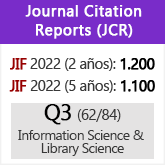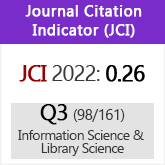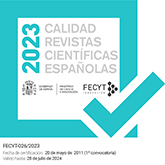La competencia informacional desde una perspectiva psicoeducativa: enseñanza basada en la resolución de problemas prototípicos y emergentes
DOI:
https://doi.org/10.3989/redc.2012.mono.978Palabras clave:
perspectiva psicoeducativa, competencia informacional, problemas prototípicos y emergentes, incidentes críticos, formación en competencias informacionalesResumen
Se realiza una aportación desde un punto de vista psicoeducativo a la definición y caracterización de la noción de competencia informacional, a su enseñanza y aprendizaje en la educación escolar, y a la formación de los profesionales de la información. En el primer apartado, se define una persona competente como aquella que es capaz de resolver adecuadamente un conjunto de problemas característicos de una determinada práctica social y comunitaria. Seguidamente, tomando como base esta definición, se identifican y caracterizan los problemas e incidentes informacionales más significativos que deben afrontar los estudiantes durante sus tareas escolares, agrupados en tres grandes bloques: relativos a la demanda y a las condiciones de su resolución; relacionados con la presencia y la activación de creencias, concepciones y conocimientos relevantes, y referidos a la regulación de las decisiones, emociones e interacción con los otros. Siguiendo con este planteamiento, se exponen algunas directrices para una formación en las competencias informacionales, basadas en tareas auténticas. El artículo concluye aportando distintas reflexiones en torno a la implementación de experiencias educativas innovadoras para el desarrollo de la competencia informacional en contextos de educación formal.
Descargas
Citas
ALISE (2010). Guidelines for Practices and Principles in the Design, Operation and Evaluation of Student Field Experiences. Recuperado el 18/12/2011 de http://www.alise.org/index.php?option=com_content&view=article&id=49
Badia, A.; Becerril, L.; Romero, M. (2010). La construcción colaborativa de conocimiento en las Redes de Comunicación Asíncrona y Escrita (RCAE): Una revisión de los instrumentos analíticos. Cultura y Educación, 22 (4), 455-474. http://dx.doi.org/10.1174/113564010793351821
Badia, A.; García, C. (2006). Incorporación de las TIC en la enseñanza y el aprendizaje basados en la elaboración colaborativa de proyectos. Revista de Universidad y Sociedad del Conocimiento (RUSC), 3 (2), 1-13.
Becerril, L. (2011). Aprenentatge col·laboratiu amb suport de l’ordinador a l’educació secundària. Influència de la demanda en el procés i els resultants d’aprenentatge. Barcelona: tesis doctoral no publicada.
Benito, F. (2000). La alfabetización en información en centros de educación primaria y secundaria. En Gómez-Hernández, J. (coord.). Estrategias y modelos para enseñar a usar la información. Guía para docentes, bibliotecarios y archiveros. KR. Recuperado el 18/12/2011 de http://eprints.rclis.org/bitstream/10760/6717/3/EMPEUIcap2.pdf
Brand-Gruwel, S.; Wopereis, I.; Walraven, A. (2009). A descriptive model of information problem solving while using internet. Computers & Education, 53, 1207-1217. http://dx.doi.org/10.1016/j.compedu.2009.06.004
Brown, A. (1987). Metacognition, executive control, self-regulation and other mysterious mechanisms. En: F. E. Weinert y R. H. Kluwe (eds.). Metacognition, motivation and understanding (pp. 65-116). Hillsdale, NJ: Erlbaum.
Bruner, J. S. (1988). Desarrollo educativo y educación. Madrid: Morata. Calderón, A. (2008). Cuestiones de debate en torno a la alfabetización, el aprendizaje, la lectura y el papel de las bibliotecas en las políticas de inclusión. En J. A. Gómez, A. Calderón y J. A. Magán (coords.). Brecha digital y nuevas alfabetizaciones (pp. 187-202). Madrid: Biblioteca de la Universidad Complutense de Madrid (documentos de trabajo). Recuperado el 18/12/2011 de http://libros.metabiblioteca.org/handle/001/173
Cerdan, R.; Vidal-Abarca. E.; Martínez, T.; Gilabert, R.; Gil, L. (2009). Impact of questionanswering tasks on search processes and reading comprehension. Learning and Instruction, 19, 13-27. http://dx.doi.org/10.1016/j.learninstruc.2007.12.003
Clark, D. B. (2000). Evaluating media-enhancement and source authority on the internet: the knowledge integration environment. International Journal Science Education, 22 (8), 859-871. http://dx.doi.org/10.1080/095006900412310
Coll, C.; Monereo, C. (2008). Educación y aprendizaje en el siglo XXI: nuevas herramientas, nuevos escenarios, nuevas finalidades. En C. Coll y C. Monereo (eds.). Psicología de la educación virtual (pp. 19-53). Madrid: Morata.
Coyro, J.; Dobler, E. (2007). Exploring the online reading comprehension strategies used by six-grade skilled readers to search for and locate information on the Internet. Reading Research Quarterly, 42 (2), 214-256. http://dx.doi.org/10.1598/RRQ.42.2.2
Darling-Hammond, L.; Snyder, J. (2000). Authentic assessment in teaching in context. Teaching and teacher Education, 16, 523-545. http://dx.doi.org/10.1016/S0742-051X(00)00015-9
De Vries, B.; Van der Meij, H.; Lazonder, A.W. (2008). Supporting reflective web searching in elementary schools. Computers in Human Behavior, 24, 649-665. http://dx.doi.org/10.1016/j.chb.2007.01.021
Dudziak, E. (2003). Information Literacy: princípios, filosofia e prática. Ciência da Informação, IBICT; 23-35. Recuperado el 18/12/2011 de http://eprints.rclis.org/bitstream/10760/6737/1/DUDZIAKCi.Inf-2004-156.pdf
Gómez-Hernández, J.A. (2009a). Aprender a enseñar competencias informacionales a los usuarios: avances en la formación profesional en España. Notas ThinkEPI. Recuperado el 18/12/2011 de http://www.thinkepi.net/aprender-a-ensenar-competencias-informacionales-a-los-usuarios-avances-en-la-formacion-profesional-en-espana
Gómez-Hernández, J.A. (2009b). La acción de las bibliotecas públicas en tiempos de crisis. Notas ThinkEPI. Recuperado el 18/12/2011 de http://www.thinkepi.net/accion-bibliotecas-publicas-tiempos-crisis
Gulikers, J.; Bastiaens, T.; Kirschner, P. (2004). A five-dimensional framework for Authentic Assessment. Educational Technology Research and Development, 52, 67-86. http://dx.doi.org/10.1007/BF02504676
Hofer, B. K. (2004). Epistemological understanding as a metacognitive process: Thinking aloud during online searching. Educational Psychologist, 39 (1), 43-55. http://dx.doi.org/10.1207/s15326985ep3901_5
Hofer, B. K.; Pintrich, P. R. (1997). The development of epistemological theories: Beliefs about knowledge and knowing and their relation to learning. Review of Educational Research, 67, 88-140.
Hoffman, J.L.; Wu, H. K.; Krajcik, J. S.; Soloway, E. (2003). The nature of middle school learners’ science content understanding with the use of on-line resources. Journal Research Science Teaching, 40 (3), 323-346. http://dx.doi.org/10.1002/tea.10079
IFLA/UNESCO (2000). Directrices para la biblioteca escolar. Recuperado el 18/12/2011 de http://archive.ifla.org/VII/s11/pubs/sguide02-s.pdf
Järvenoja, H.; Järvelä, S. (2005). How students describe the sources of their emotional and motivational experiences during the learning process: A qualitative approach. Learning and Instruction, 15 (5), 465-480. http://dx.doi.org/10.1016/j.learninstruc.2005.07.012
Kuiper, E.; Volman, M.; Terwel, J. (2008). Integrating critical Web skills and content knowledge: development and evaluation of a 5th grade curriculum unit. Computers in Human Behavior, 24 (3), 666-692. http://dx.doi.org/10.1016/j.chb.2007.01.022
Last, D. A.; O’ Donnell, A. M.; Kelly, A. E. (2001). The effects of prior knowledge and goal strength on the use of hypertext. Journal of Educational Multimedia and Hypermedia, 10 (1), 3-25.
Lawless, K. A.; Kulikowich, J. M. (1996). Understanding hypertext navigation through cluster analysis. Journal of Educational Computing Research, 14 (4), 385-399. http://dx.doi.org/10.2190/DVAP-DE23-3XMV-9MXH
Lazonder, A. W. (2005). Do two heads search better than one? Effects of student collaboration on web search behavior and search outcomes. British Journal of Educational Technology, 36 (3), 465-475. http://dx.doi.org/10.1111/j.1467-8535.2005.00478.x
Li, Y.; Belkin, N. J. (2008). A faceted approach to conceptualizing tasks in information seeking. Information Processing & Management, 44 (6), 1822-1837. http://dx.doi.org/10.1016/j.ipm.2008.07.005
Lou, Y.; Abrami, P.C.; Spence J.C.; D’Apollonia, S. (2001). Small group and individual learning with technology: a meta analysis. Review of Educational Research, 71, 449-521. http://dx.doi.org/10.3102/00346543071003449
Monereo, C. (2009). La autenticidad de la evaluación. En M. Castelló (coord.), La evaluación auténtica en Enseñanza Secundaria y universitaria: investigación e innovación (pp. 15-28). Barcelona: Edebé.
Monereo, C.; Fuentes, M. (2005). Aprender a buscar y seleccionar en Internet. En C. Monereo (coord.) Internet y competencias básicas (pp. 27-50). Barcelona: Grao.
Monereo, C.; Fuentes, M. (2008). La enseñanza y el aprendizaje de estrategias de búsqueda y selección de información en entornos virtuales. En C. Coll y C. Monereo (eds.). Psicología de la educación virtual (pp. 386-408). Madrid: Morata.
Monereo, C.; Fuentes, M.; Sánchez, S. (2000). Internet search and navigation strategies used by experts and beginners. Interactive Educational Multimedia, 1, 24-34.
Moore, P. (1995). Information problem solving: A wider view of library skills. Contemporary Educational Psychology, 20, 1-31. http://dx.doi.org/10.1006/ceps.1995.1001
Nicaise, M.; Gibney, T.; Crane, M. (2000). Toward an understanding of authentic learning: students perceptions of an authentic classroom. Journal of Science Educational and Technology, 9, 79-94. http://dx.doi.org/10.1023/A:1009477008671
Paris, S. C.; Lipson, M. Y.; Wixson, K. K. (1983). Becoming a strategic reader, Contemporary Educational Psychology, 8, 293-316. http://dx.doi.org/10.1016/0361-476X(83)90018-8
Ortoll, E. (2004). La competencia informacional en las ciencias de la salud. Una visión desde las universidades españolas. Revista Española de Documentación Científica, 27 (2), 221-241.
Puntambekar, S.; Stylianou, A. (2005). Designing navigation support in hypertext systems based on navigation patterns. Instructional Science, 33 (5-6), 451-481. http://dx.doi.org/10.1007/s11251-005-1276-5
Quintana, C.; Zhang, M.; Krajcik, J. (2005). A framework for supporting metacognitive aspects of online inquiry through software-based scaffolding. Educational Psychologist, 40 (4), 235-244. http://dx.doi.org/10.1207/s15326985ep4004_5
Rouet, J. F. (2006). The skills of document use: From text comprehension to Web-based learning. Mahwah, NJ: Erlbaum.
Shapiro, A.M.; Niederhauser, D. (2004). Learning from hypertext: research issues and findings. En D. H. Jonassen (ed.), Handbook of research on educational communications and technology (2nd ed., pp. 605-620). Maheah, NJ: Lawrence Erlbaum Associates.
Taylor, R. S. (1991). Information use environments. En B. Dervin y M. J. Voigt (eds.). Progress in communication science, vol. X (pp. 217-255). Norwood, NJ: Ablex.
Tricot, A.; Coste, J. P. (1995). Evaluating complex learner-computer interaction: What criteria for what task? En EARLY’95 Conference, Symposium Analysing learner computerinteraction: lessons from empirical studies. Nijmegen, Netherlands, 26-31.
Tsai, C.C. (2004). Beyond cognitive and metacognitive tools: The use of the Internet as an «epistemological» tool for instruction. British Journal of Educational Technology, 35, 525-536. http://dx.doi.org/10.1111/j.0007-1013.2004.00411.x
Tsai, C.C.; Chuang, S.C. (2005). The correlation between epistemological beliefs and preferences toward internet-based learning environments. British Journal of Educational technology, 36 (1), 97-100. http://dx.doi.org/10.1111/j.1467-8535.2004.00442.x
Walraven, A.; Brand-Gruwel, S.; Boshuizen, P.A. (2009). How students evaluate information and sources when searching the World Wide Web for information. Computers and Education, 52, 234-246. http://dx.doi.org/10.1016/j.compedu.2008.08.003
Whitmire, E. (2003). Epistemological beliefs and the information-seeking behaviour of undergraduates. Library and Information Science Research, 25, 127-142. http://dx.doi.org/10.1016/S0740-8188(03)00003-3
Willoughby, T.; Anderson, S. A.; Wood, E.; Mueller. J.; Ross, C. (2009). Fast searching for information on the Internet to use in a learning context: The impact of domain knowledge. Computers & Education, 52, 640-648. http://dx.doi.org/10.1016/j.compedu.2008.11.009
Wolf, S. E.; Brush, T.; Saye, J. (2003). Using an information problem-solving model as a metacognitive scaffold for multimedia-support information-based problems. Journal of Research on Technology in Education, 35, 321-341.
Wopereis, S.; Brand-Gruwel S.; Vermetten, Y. (2008). The effect of embedded instruction on solving information problems. Computers in Human Behavior, 24 (3), 738-752. http://dx.doi.org/10.1016/j.chb.2007.01.024
Wosnitza, M.; Volet, S. (2005). Origin, direction and impact of emotions in social online learning. Learning and Instruction, 15 (5), 449-464. http://dx.doi.org/10.1016/j.learninstruc.2005.07.009
Zanotto, M.; Monereo, C.; Castelló, M. (2011). Estrategias de lectura y producción de textos académicos: leer para evaluar un texto científico. Perfiles educativos, 23, 133; 10-29.
Descargas
Publicado
Cómo citar
Número
Sección
Licencia
Derechos de autor 2012 Consejo Superior de Investigaciones Científicas (CSIC)

Esta obra está bajo una licencia internacional Creative Commons Atribución 4.0.
© CSIC. Los originales publicados en las ediciones impresa y electrónica de esta Revista son propiedad del Consejo Superior de Investigaciones Científicas, siendo necesario citar la procedencia en cualquier reproducción parcial o total.Salvo indicación contraria, todos los contenidos de la edición electrónica se distribuyen bajo una licencia de uso y distribución “Creative Commons Reconocimiento 4.0 Internacional ” (CC BY 4.0). Puede consultar desde aquí la versión informativa y el texto legal de la licencia. Esta circunstancia ha de hacerse constar expresamente de esta forma cuando sea necesario.
No se autoriza el depósito en repositorios, páginas web personales o similares de cualquier otra versión distinta a la publicada por el editor.

















